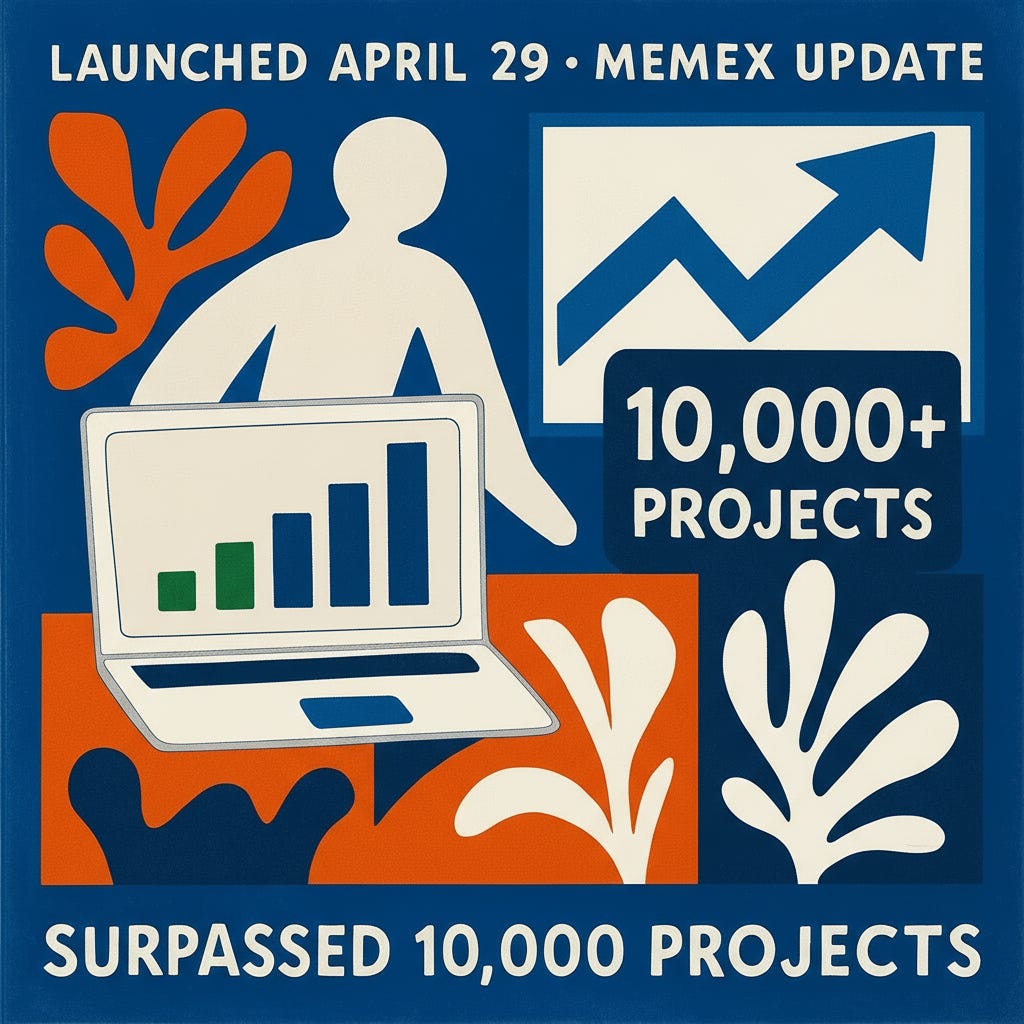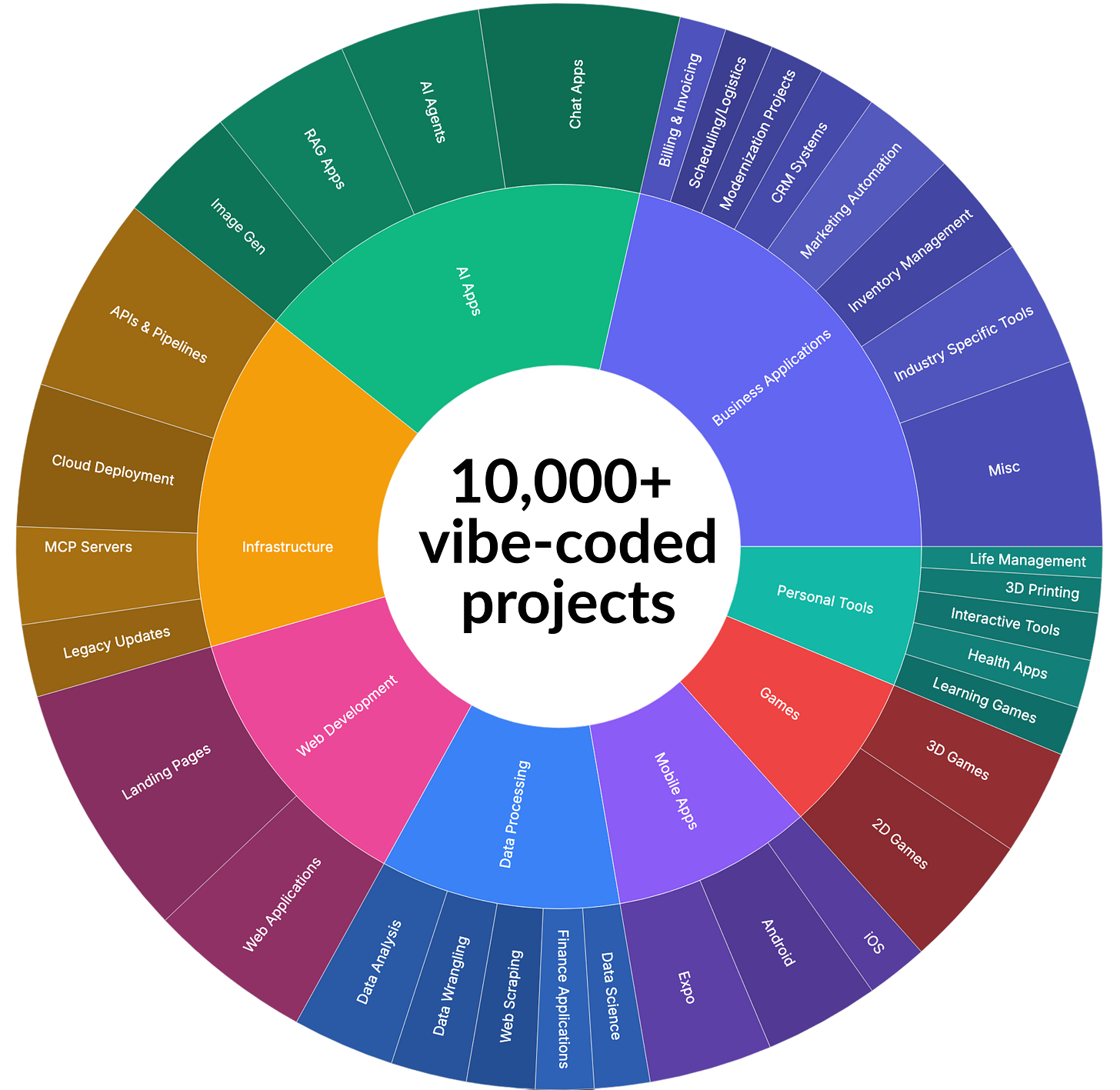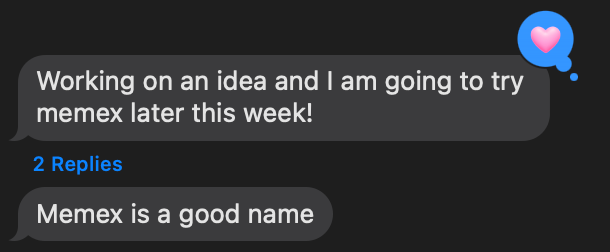From December last year until April 29th, we were heads-down at Memex in a closed-beta. Our focus was singular: get the core product to a point where it helped users get to value. We kept things low-key, iterating based on feedback from our early users.
Then, on April 29th, we launched. Before launch, around 3,000 projects had been created during our ~5-month closed-beta. In the 72 hours *after* launch, that number surged past 10,000. The total project count more than tripled in just three days.
It's been exciting, validating, and … chaotic. The growth is strong, a signal that maybe this idea of "vibe coding" – enabling people to bring software ideas to life without actually writing code – has legs. My main question has been: “what are people building?”, which we’ll try to unpack some in this post.
I find startup journeys depicted online gloss over the less glamorous bits. In the spirit of leaving ego at the door and sharing the reality, so I’m also going to share the egg-in-our-face moments since launch.
What Are People Building?
Memex is designed as a general-purpose tool, so we’ve been very interested in what categories would have the highest demand. But Memex is also privacy-first. Unlike many of the app builders out there, we don’t ever see the user’s code— it always stays on their local machine or wherever they deploy it. This is core to our philosophy, but it presents a challenge: how do you understand what people are doing with your tool?
We used a combination of telemetry data and direct discussions with our users through Discord and Google Hangouts to get a sense of what use cases people are using Memex for. To make sense of this fuzzy data, I did the obvious: I used Memex itself to wrangle these disparate inputs and attempt to categorize the emerging use cases. The result is something like this visualization:
It's not perfect, but it paints a picture of emergent behavior. While I expected certain categories, other patterns have been a surprise.
Highlights from the 10,000+:
AI Apps: Given the current wave, AI applications are unsurprisingly a huge category. We’re seeing everything from RAG (Retrieval-Augmented Generation) Apps and AI Agents to Chat Apps and Image Generation tools. People are using Memex to prototype and build on top of the latest AI models, and this was expected.
Business Tools: I continue to be surprised by the breadth of tools needed for small businesses. Everyday I hear of use cases and think “yeah, that makes sense— but I would have never thought that was a need”. For example, a pastry chef used Memex to create an app for managing scheduling their team, managing inventory of ingredients and optimizing procurement. It makes sense: essentially an ERP tool. But a small bakery will get by without buying the off-the-shelf software for it. Yet when they can spend a weekend building it for themselves, it becomes a viable option for them.
Mobile Apps: We expected to see lots of people build mobile apps. But the segment I found surprising is that there are a significant amount of people who had apps developed by an outsourced developer, but now they can’t maintain the app, add features, fix bugs, etc. They’re using Memex to update and refine apps that are otherwise orphaned.
Model Context Protocol: Because we’re so deep in the world of agents, part of me thought even more people would be building MCP servers. But we’re thinking this segment might take off more in the coming months … We’ve been glad to see a non-trivial amount of activity here.
One meta point is that there’s quite a lot of variance in the number of projects per user. Of course, the majority of projects now are quite young, so there’s a limit to what we can know here. But from the closed-beta phase, we know that some users tend to work on the same project (or handful of projects) and evolve them over time. Whereas others are creating smaller projects daily—like internal tools and one-off data analyses.
The Egg on our Face
Okay, let's talk about the less shiny side. Scaling surfaces all the sharp edges you haven't sanded down yet.
Getting slammed on Hacker News and X
We were proud to be on the front page of Hacker News for a few hours on launch day.
The community was mostly very receptive … but we also got an earful about the things they didn’t like …
For one, we had an anti-competition clause in our Terms and Conditions. It was boilerplate from our lawyers that I should have caught. But I didn’t, and we heard LOUD AND CLEAR that it was unacceptable.
As you can see, we fixed that quickly. But nevertheless it remained the top comment.
Others went straight for the juggler. I got a bit sassy … still finding my feat when it comes to sparring over the internet — something I never imagined I would be doing!
And then, there was the name …
We heard about the name in 5 different comments (out of 86). None of them were positive! We also heard these same themes on Twitter.
Here are some themes we heard regarding the name:
Meme X? Some people hear "Meme X," assume it's related to internet memes, connect it to "Vibe Coding," and conclude we must be trolling them. I assure you, we are not.
The Indonesian Meaning: We discovered that "Memex" is slang for female genitalia in Indonesian. Facepalms were had. Apologies to my Indonesian friends; the coincidence is unfortunate and unintentional.
Cheapening something sacred: A lot of people respect Dr. Vannevar Bush and his contributions to science and engineering. He introduced the concept of the Memex in his essay As We May Think. The ethos of that essay is why we named our product after it. But many felt that (1) our product doesn’t live up to the name, (2) isn’t close enough to the original vision to be called Memex, or (3) is disrespectful to other projects already named Memex.
Honestly, I can understand/empathize with all of those points. You’re never going to get things perfect. But frankly—we don’t have any time to spend on the name right now … we will live and die by whether we make the product something love and continue to use over time. If we’re not doing that, none of it will matter anyways. And if we are doing that, we’ll either live up to the name or have the capacity to rebrand if we feel we should.
(for the record, I also got DMs from people who liked the name!)
The Inevitable Bugs
We knew we’d hit some bugs as we ramped capacity. That’s consumed most of the time since launch—squashing them to make sure all users are having good experiences. A couple of the notable ones:
Shell Issues: At launch we only supported Bash and Zsh, the most common shells. Turns out, a number of more technical users loves fish shell, and so we hustled to get support for it out ~36 hours after launch.
Out of sync admin panel: Our admin dashboard which (among other things) manages load balancing across Ant, GCP, and Bedrock had a bug where some of its data was out of sync with our database. So we were trying to fix other bugs with incorrect data.
Next Steps
Surpassing 10,000 projects is a small win to celebrate. More than that, it’s real usage for use cases from users that we will dig into to identify how we can help our users be more successful.
The concept of vibe coding is quite polarizing today. Some people are “all in”. Others are skeptical. My take is that there are many use cases for which it is a great option, and many use cases where it would be dangerous and/or unproductive to use. Our job with Memex is to zero in on those use cases where it is a great option, get it in front of users, and help them get to success.
Thanks
Finally: for all of you who has tried Memex, filed a bug report, shared what you're building, or just joined the vibe — thank you! We’re eager to improve and build alongside you.









